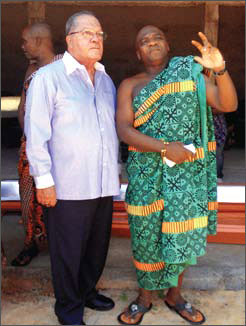The Elmina Castle where slaves were kept for the Tras-Atlantic slave trade is in this area

Nana Kodwo Condua VI explaining to FICAC President details of the new Palace being erected near the Elmina Castle.
Elmina Castle, erected by the Portuguese in 1482 as a first European trading post in West Africa soon after became a major site of the trans-Atlantic slave trade. Our visit here today is thus fundamentally linked to a most significant episode in world history, with lasting memories and legacies even today. This year (2008) is remembered and recognized as the bicentennial of the official abolition of the trans-Atlantic Slave trade by the United States, 200 years ago. A similar recognition occurred last year – – the bicentennial of the official abolition of the trans-Atlantic Slave trade by Britain in 1807.
I deliberately use the term “official,” since it was quite sometime after these events of 1807 and 1808 that the termination of the trans-Atlantic slave trade actually materialized, due to various circumstances and lax enforcement measures – – with the significant exception of Haiti which freed itself from French-imposed slavery and colonialism in its 1804 revolution.
It took almost another century for the institution of trans-Atlantic slavery to be finally abolished in the Americas – – beginning in the British colonial possessions (including my native land Jamaica) in the 1830’s, through the United States in the 1860’s, and finally to Cuba and Brazil in the 1880’s.
It is necessary to place in global historical perspective the significance of the trans-Atlantic slave trade and associated patterns of enslavement. This was the largest involuntary population transfer in history, involving by many estimates at least 15-20 million Africans and perhaps more. It lasted over four centuries (from the initiation by Portugal of the sale of Africans in Lisbon in 1441 to the abolition of the institution of slavery in Brazil in 1885). It involved all the major European Powers, in those early stages of European international expansion and emerging global domination.
African slave-labour was a fundamental ingredient of the economic foundations of the emerging “New World” especially in the United States, Brazil, and the Caribbean. This contributed economically to the emerging industrial revolution in Europe while simultaneously undermining and marginalizing Africa in the emerging modern international system.
The world experienced other patterns of slavery before and since trans-Atlantic slavery, but its most distinctive aspect was its racial foundations. The enslavers were of one color, the enslaved of another, which in the context of emerging European expansionism and global domination culminated in the institutionalization of racialized thought and practice, with echoes and residues still in the present.
But alongside (or beyond) the horrors and oppressions associated with trans-Atlantic slavery is another important factor, namely the constant struggles of enslaved Africans for dignity and freedom. It is not accidental that two of the six National Heroes recognized by my native-land Jamaica after the acquisition of political independence from Britain in 1962 are: Nanny (an 18th century female leader of the Maroon challenge to British imperialism) and Sam Sharpe (leader of a major slave revolt in 1832, the year preceding the official abolition of slavery in Jamaica).
The resistance and liberation struggles of enslaved Africans – – beginning from the shores of Africa across the Atlantic to the Americas – convey wider meanings, past and present as expressed in these words of a most distinguished African international personality, AMADOU – MATHAR M’BOW of Senegal in 1981, during his tenure as Director-General of the United Nations Educational, Scientific and Cultural Organization (UNESCO):
“…the resistance of the slaves shipped to America, the constant and massive participation of the descendants of Africans in the struggles for the initial independence of America and in national liberation movements, are rightly perceived for what they were: vigorous assertions of identity, which helped forge the universal concept of mankind.”
M’BOW’s statement continues to challenge our mission as the World Federation of Consuls, to help in forging the universal concept of humankind. Thank you.